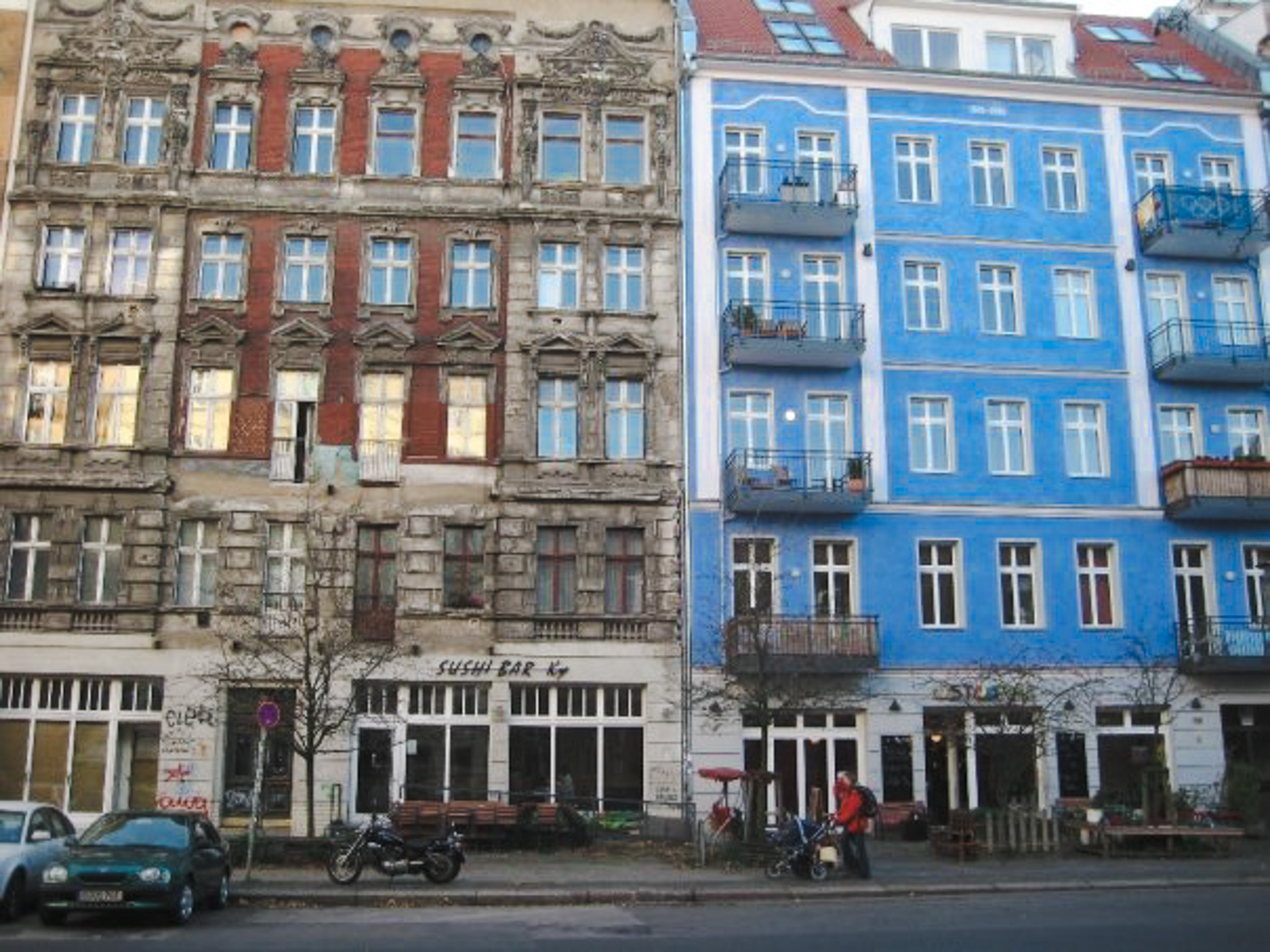I just got back from Moscow. My friend Micha picks me up from the airport. I’ll be staying at his shared yuppie apartment for the next few days. “Well, Mr. Helmbrecht? Welcome to Berlin!” he greets me. It’s nice having friends everywhere and not having to crash in a hotel. “What’s new?” I ask. “We’ve got a new flatmate in the apartment,” Micha says enthusiastically. “You’re going to like her.” – “You think so?” – “Absolutely. She’s totally your type. A woman of class.”
Well, let’s see. I remember a business meeting in Moscow the week before I left. Dominik picks me up at reception and takes me to the conference room. “You’re meeting Ms. Helmbrecht today,” he says casually. “She’s gorgeous, a model type. Totally your type!” Five minutes later, I meet my counterpart, and well … let’s just say she’s not Ms. Helmbrecht. For the first ten minutes, I keep waiting for the door to open and my dream woman to walk in. Then I finally get it—Dominik’s playing a prank. He’s sitting across from me, unable to hide his grin.
“So, what’s your new flatmate like?”, I ask Micha – “She’s Croatian. A doctor at Charité. She moved in last week. We’re really glad we found her.” – “Well, let’s see.” Later, at Micha’s place, I finally meet her. Her name is Anika. She’s nice, but not exactly my type at first glance. Anika cooks pasta while I unpack the vodka I brought. As usual, we gather in the living room and chat. After a few vodkas, the conversation gets livelier. Anika joins us, and we talk about everything—life, the universe, and often God, because Anika is Catholic and deeply religious. She tells us about her travels and how she walked the Camino de Santiago.
Later, the topic shifts to flying. “Anika, do you have a pilot’s license?” – “Yes, over 500 hours of flight experience.” – “Yeah, right,” I think, and start asking detailed questions. But she answers them effortlessly, and soon I’m on the defensive.
“Oh, you play golf?” Anika asks. “I have a handicap of 2.” – “Wow, I’ve been stuck at 54 for years, playing only three or four times a year.” This woman seems to be better at everything than me. We hop from topic to topic, and Anika always has something to say. She seems accomplished and incredibly intelligent. “Does that intimidate you?” she asks. – “No, I have no problem with people being better or smarter than me.” – “And me being a woman?” – “Why would that be a problem? If anything, it makes you more interesting.” – “Good,” she says, flashing a big grin. Is she flirting with me? “Most men have a hard time dealing with the fact that I’m strong and intelligent,” she adds.
Later, Micha’s other flatmate joins us. We sit together, drinking wine and vodka, talking late into the night. It’s fascinating listening to Anika. The following week, the flat plans a Thanksgiving dinner. “I’ve ordered a few things for Thanksgiving,” Anika says. “That’s okay, right?” – “What things?” the other two ask. “A few napkins. Oh, and I went to Stilwerk and bought new cutlery.” – “Ah,” Micha marvels, probably thinking: Who’s paying for this? As if reading his mind, she responds, “Don’t worry, I’ll cover it—and the other stuff too.” – “What other stuff?” – “A bigger table, new chairs, a new fridge …” The list goes on, and the flatmates’ faces grow longer.
Finally, there’s silence. I break it by asking how much she spent. “75,000 euros,” Anika says nonchalantly. “It’s all being delivered next week.” The other two are still speechless.
“Who are you? How do you have so much money?” I ask. “My family is wealthy. I work for fun—that’s why I became a doctor and went into cancer research. I want to do good.” I find myself liking her more and more, and I start to respond to her flirting. It’s not about the money. She impressed me before, but I can’t deny it’s a bonus.
She’s nice, flies planes, is incredibly intelligent, and has money. Somehow, she reminds me of Emily, my $40-million girl. I let her go back then, and I’ve regretted it often. I thought I was staying true to my values. A life as a millionaire husband, free of financial worries, working just for fun—looking back, it doesn’t sound so bad. Plus, Emily was amazing in bed. But oh well. She’s married someone else and just had a baby.
Lately, everyone around me seems to be getting married. My “great love,” or at least the one I think of that way, reached out on Facebook last week. Life without her has been good, but my heart bled for a long time after she left. Slowly, very slowly, I got over her—or so I thought. She was the one. She still is, I often think. Then she vanished from my life completely. No emails, no signs of life. Five years later, she messages me on Facebook, and my mind starts racing again. Two clicks later, I find out she has a child now, and I’m somehow disappointed. Apparently, I never really gave up hope. But it’s all just fantasy. She wasn’t, and isn’t, who I imagined her to be. Funny how we deceive ourselves sometimes.
Now, this golden girl is sitting across from me, and I find myself liking her more and more. She’s sending the right signals, impressing me minute by minute. At one point, she mentions skiing. “I have a house in France,” she says. – “Where?” I ask. – “In La Grave.” Bingo! I used to go to La Grave often. To me, it’s one of the most beautiful spots in the Alps—and also one of the most extreme. Not for beginners. It’s where the elite of extreme sports gathers—skiers, snowboarders, ice climbers, base jumpers. Some stay for days or weeks; others, for the whole season. I’ve always wanted to buy a house in La Grave. And now Anika is sitting across from me, claiming she has one. “We should go to La Grave together,” she says with a grin.
The next day, I wake up with a pounding headache. I’m sitting on a flight to Cologne, still quite drunk after just three hours of sleep. This meeting is going to be rough. Standing in the shuttle bus to the terminal, my phone rings. It’s Micha. “Did she really say yesterday that she bought stuff for 65,000 euros?” he asks. – “No, it was 75,000,” I reply. – “Crazy! Did you know she was that wealthy?” – “No, I had no idea until yesterday.” – “But what’s a woman like that doing in a shared flat? In a 10-square-meter room?” We can’t figure it out, but we both agree she’s nice. During the roommate interview, she gave all the right signals. Everything else fits, and she must have her reasons.
That evening, I spend time with Anika alone. We have another great conversation. This time, she asks me deeply personal questions, making me reflect on myself. Where am I in life? Where do I want to go? Do I still have concrete goals? Eventually, she asks what I would do if I had a lot of money. I can’t answer the question, and it somehow makes me feel awkward. It almost sounded like an offer.
The next day, I have to head back to Moscow. It’s Thursday, and my friends are going to Cookies that evening. I’d told Anika about it and mentioned how much I wished I could stay one more day. She said she’d love to go too, so I call my friends and ask if they can take her along. Naturally, I share how impressed I am by her, and I throw in the story about her 75,000-euro shopping spree.
By Friday, I’m back in Moscow. Sitting at my desk, I hear from my friend, who’s also smitten with Anika. Shortly after, Anika messages me on Skype. She seems equally taken with him and asks me all sorts of questions about him. I feel a twinge of disappointment. Well, that’s how it goes. I’ve lost out, but if it makes my friend happy, then so be it. Maybe I wasn’t good enough. Then I dismiss the thought. After all, I never really showed interest in Anika myself.
I’m at home, working on my computer, when Anika pings me on Skype. “Hey,” she says excitedly, “your friends are amazing. I think I’m in love!”
For some reason, I feel disappointed. I send back meaningless replies and reflect on myself. Is it wounded pride? Did I develop feelings for her, or was it just about the money? Why else would I feel disappointed? It’s one of those moments when you don’t like yourself much. Eventually, I feel even more let down and try to end the conversation, but Anika keeps chatting away. Finally, I say I’m tired and need to go to bed. I log off and keep thinking about it until I fall asleep.
Over the next few days, I keep hearing from Anika. Sometimes she’s at the hospital, Skyping during her breaks, and other times she’s at home. She sends me details about her meetings with my friend and quizzes me about him. To keep things neutral, I avoid names and just call him “my friend” now. She tells me there’s another guy in the picture and she can’t decide. No, it’s my friend who can’t decide. She’s ready for something serious, but he’s dragging his feet. She talks as if it’s about the love of her life—the dream man, the soulmate, the one she’ll marry. And she seems to be in a hurry. “Do you want a family and kids?” I ask. “Yes, absolutely,” she replies firmly.
Two weeks later, Micha tells me that one of his friends is also “very taken” with Anika and has invited her to the opera. Huh, didn’t she just go to the opera with my friend? Well, she clearly enjoys the opera. Something about her rubs me the wrong way, but I quickly dismiss the thought, figuring it’s just my bruised ego.
December. My Russian teacher, Natasha, is here, and we’re going over homework when the phone rings. It’s Micha. He says it’s important, so I ask Natasha to pause. She sits next to me, listening. “I need your advice,” Micha says. “Something’s off about Anika.”
The next day, Micha calls me again. “What do you mean?” I ask.
“Her stories often don’t add up, and there are contradictions. She says she’s in New York.”
“And? What’s so unusual about that?” I ask.
“She emails us almost daily, asking what she should bring back for us. She’s pushy, even though we’ve told her we don’t need anything.”
“And?” I respond. “That sounds nice.”
“In the end, we asked her to bring something, but now she’s gone silent. She practically forced it on us,” Micha says. He tells me he checked the IP address of her emails.
“And?”
“The IP address traces to Kassel,” Micha says. “So, she’s not in New York!”
Anika recently had visitors from Kassel—an older couple who seemed like respectable people. The man is apparently a dean. Allegedly, they’re friends of her family. Micha also points out that part of last month’s rent was transferred from Kassel. “I don’t care where she is, and it’s none of my business whether she actually goes to New York or not. She can go wherever she wants,” Micha says, clearly frustrated. “But why does she keep insisting on bringing us something? I’m telling you, something’s off.”
We talk for a few more minutes, comparing our stories about Anika. A lot doesn’t add up. Damn, I think. I need to warn my friend. Natasha, my Russian tutor, listens attentively. It must sound like a crime thriller.
After my lesson, I call my friend and tell him everything. He’s shocked. Anika had accompanied him to the hospital for a family matter and introduced herself as a doctor from Charité. “Do you think that’s a lie too?” he asks, unsettled. My friend is torn. Anika has built a deep sense of trust with him and his family, and now it’s shattered into a thousand pieces. “I’m sorry,” I say quietly. It’s the first time I apologize, but it won’t be the last.
“What are you sorry for?” he asks.
“That I introduced her to you,” I admit, guilt weighing on me.
“And now?” he asks.
I feel responsible. Anika has infiltrated his social circle and even tried to initiate business deals with some of his friends.
“What kind of deals?” I ask.
“They didn’t materialize,” he says, “because she disappeared without a word. But she still caused damage—my friends turned down other opportunities in the meantime.”
That evening, I call a few contacts, trying to dig up information through my Serbian and Croatian acquaintances. No one knows her. Then, I reach out to an old colleague in the police force, but he can’t divulge anything either. “I think this woman has skeletons in her closet,” I say. “Someone who flaunts their wealth like that and then lives in a shared flat—it doesn’t add up. Maybe she’s wanted for questioning. Maybe for fraud. Posing as a doctor is title misuse. And there could be other charges.” My vague suspicions aren’t enough to get any concrete answers. My ex-colleague hesitates, and I drop it. Anyway, her name is probably fake. I’ve googled her first and last names, and Anika only appears online starting in October 2008. I almost invited her to the elite communities Small World and Schwarze Karte. I’m relieved I didn’t—she could have exploited even more of my connections.
A month later, I’m back in Berlin. Anika has moved out. She didn’t pay rent again, and for the last few weeks, even her brother had been staying with her. That was too much for her roommates, and they kicked her out. She did pay the final month’s rent after being threatened with the police. My other friend wasn’t so lucky. Anika borrowed money from him and others and then vanished.
It’s lunchtime, and my friend and I are eating Thai. We’re talking about Anika. He looks at me almost accusingly.
“At least tell me you slept with her,” I joke.
My friend is a gentleman. He grins but stays silent.
“I’m really sorry. Honestly. I’ll be more cautious about introducing people in the future. But you can’t entirely blame me. I just asked if you could take her along to Cookies for one evening. How could I have known you’d get so close? Besides, I fell for her just as much as you did. If I hadn’t flown back to Moscow, who knows what might have happened? Man, I really am sorry. Let’s put this behind us.”
He nods silently.
“As far as I’m concerned, this is over,” I add.
We pay and part ways, thankfully still friends.
A few days later, the phone rings. The Anika saga isn’t over yet. Micha is on the line.
“There’s a letter from the prosecutor for Anika,” he says.
“What does it say?” I ask.
“I’m not opening that. I sent it back immediately.”
“Good. Then, as far as I’m concerned, this is over too,” I tell Micha. “I don’t want to hear anything more about her!”
Well, not quite. I still need to delete Anika from my Facebook contacts. And that’s it. We’ll probably never know who Anika really is. A con artist? Mentally ill? Schizophrenic? I used to be more trusting. Before Anika, I always tried to connect good people, sometimes a bit recklessly. Now, I’m more cautious. To truly vet someone, you need time—and lots of it. At the very least, I’ll Google their name in the future, and if nothing comes up, I’ll tread carefully. Strange, isn’t it? What kind of world do we live in where this has become necessary? Ten years ago, I would never have thought to look up a new acquaintance in a search engine.



